Analysis of Life Cycle Costing for Circular Economy in Water SMEs
VerifiedAdded on 2021/04/17
|8
|1428
|32
Report
AI Summary
This research proposal examines the feasibility of life cycle costing for circular economy business models within the Small and Medium Enterprises (SMEs) in Bangladesh's water sector. It investigates the potential of water resource management to enhance the agricultural and food sectors through sustainable practices. The study aims to evaluate various factors influencing life cycle costing, assess the role of SMEs in adopting circular economy models, and identify opportunities for improving production and export. The research employs a mixed-methods approach, including a literature review and both primary and secondary data collection. Primary data will be gathered through surveys using random sampling, while secondary data will be collected from academic journals, online publications, and industry reports. The data analysis will involve quantitative methods for the survey responses and thematic analysis for the secondary data, providing a comprehensive understanding of the research questions.
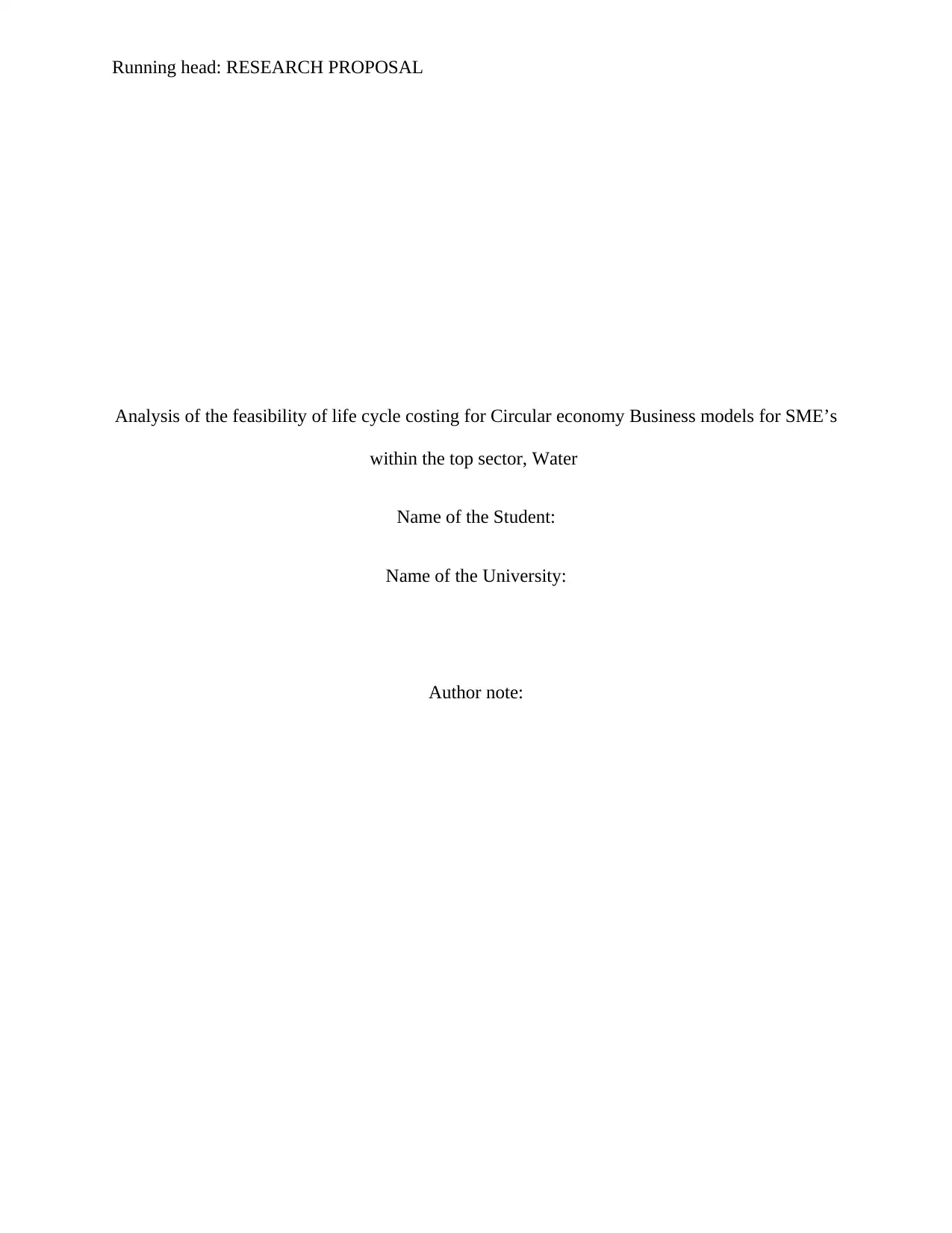
Running head: RESEARCH PROPOSAL
Analysis of the feasibility of life cycle costing for Circular economy Business models for SME’s
within the top sector, Water
Name of the Student:
Name of the University:
Author note:
Analysis of the feasibility of life cycle costing for Circular economy Business models for SME’s
within the top sector, Water
Name of the Student:
Name of the University:
Author note:
Paraphrase This Document
Need a fresh take? Get an instant paraphrase of this document with our AI Paraphraser
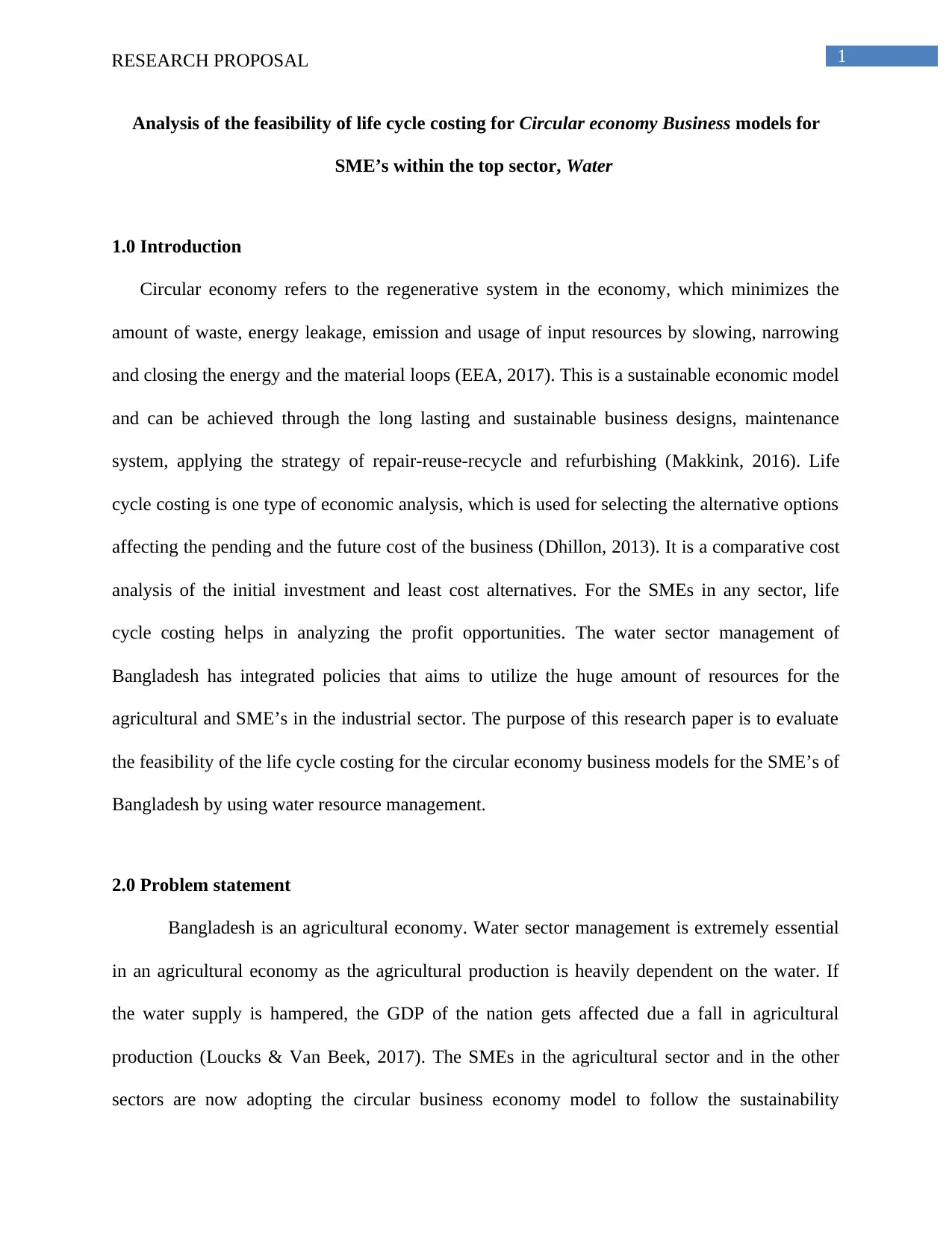
1RESEARCH PROPOSAL
Analysis of the feasibility of life cycle costing for Circular economy Business models for
SME’s within the top sector, Water
1.0 Introduction
Circular economy refers to the regenerative system in the economy, which minimizes the
amount of waste, energy leakage, emission and usage of input resources by slowing, narrowing
and closing the energy and the material loops (EEA, 2017). This is a sustainable economic model
and can be achieved through the long lasting and sustainable business designs, maintenance
system, applying the strategy of repair-reuse-recycle and refurbishing (Makkink, 2016). Life
cycle costing is one type of economic analysis, which is used for selecting the alternative options
affecting the pending and the future cost of the business (Dhillon, 2013). It is a comparative cost
analysis of the initial investment and least cost alternatives. For the SMEs in any sector, life
cycle costing helps in analyzing the profit opportunities. The water sector management of
Bangladesh has integrated policies that aims to utilize the huge amount of resources for the
agricultural and SME’s in the industrial sector. The purpose of this research paper is to evaluate
the feasibility of the life cycle costing for the circular economy business models for the SME’s of
Bangladesh by using water resource management.
2.0 Problem statement
Bangladesh is an agricultural economy. Water sector management is extremely essential
in an agricultural economy as the agricultural production is heavily dependent on the water. If
the water supply is hampered, the GDP of the nation gets affected due a fall in agricultural
production (Loucks & Van Beek, 2017). The SMEs in the agricultural sector and in the other
sectors are now adopting the circular business economy model to follow the sustainability
Analysis of the feasibility of life cycle costing for Circular economy Business models for
SME’s within the top sector, Water
1.0 Introduction
Circular economy refers to the regenerative system in the economy, which minimizes the
amount of waste, energy leakage, emission and usage of input resources by slowing, narrowing
and closing the energy and the material loops (EEA, 2017). This is a sustainable economic model
and can be achieved through the long lasting and sustainable business designs, maintenance
system, applying the strategy of repair-reuse-recycle and refurbishing (Makkink, 2016). Life
cycle costing is one type of economic analysis, which is used for selecting the alternative options
affecting the pending and the future cost of the business (Dhillon, 2013). It is a comparative cost
analysis of the initial investment and least cost alternatives. For the SMEs in any sector, life
cycle costing helps in analyzing the profit opportunities. The water sector management of
Bangladesh has integrated policies that aims to utilize the huge amount of resources for the
agricultural and SME’s in the industrial sector. The purpose of this research paper is to evaluate
the feasibility of the life cycle costing for the circular economy business models for the SME’s of
Bangladesh by using water resource management.
2.0 Problem statement
Bangladesh is an agricultural economy. Water sector management is extremely essential
in an agricultural economy as the agricultural production is heavily dependent on the water. If
the water supply is hampered, the GDP of the nation gets affected due a fall in agricultural
production (Loucks & Van Beek, 2017). The SMEs in the agricultural sector and in the other
sectors are now adopting the circular business economy model to follow the sustainability
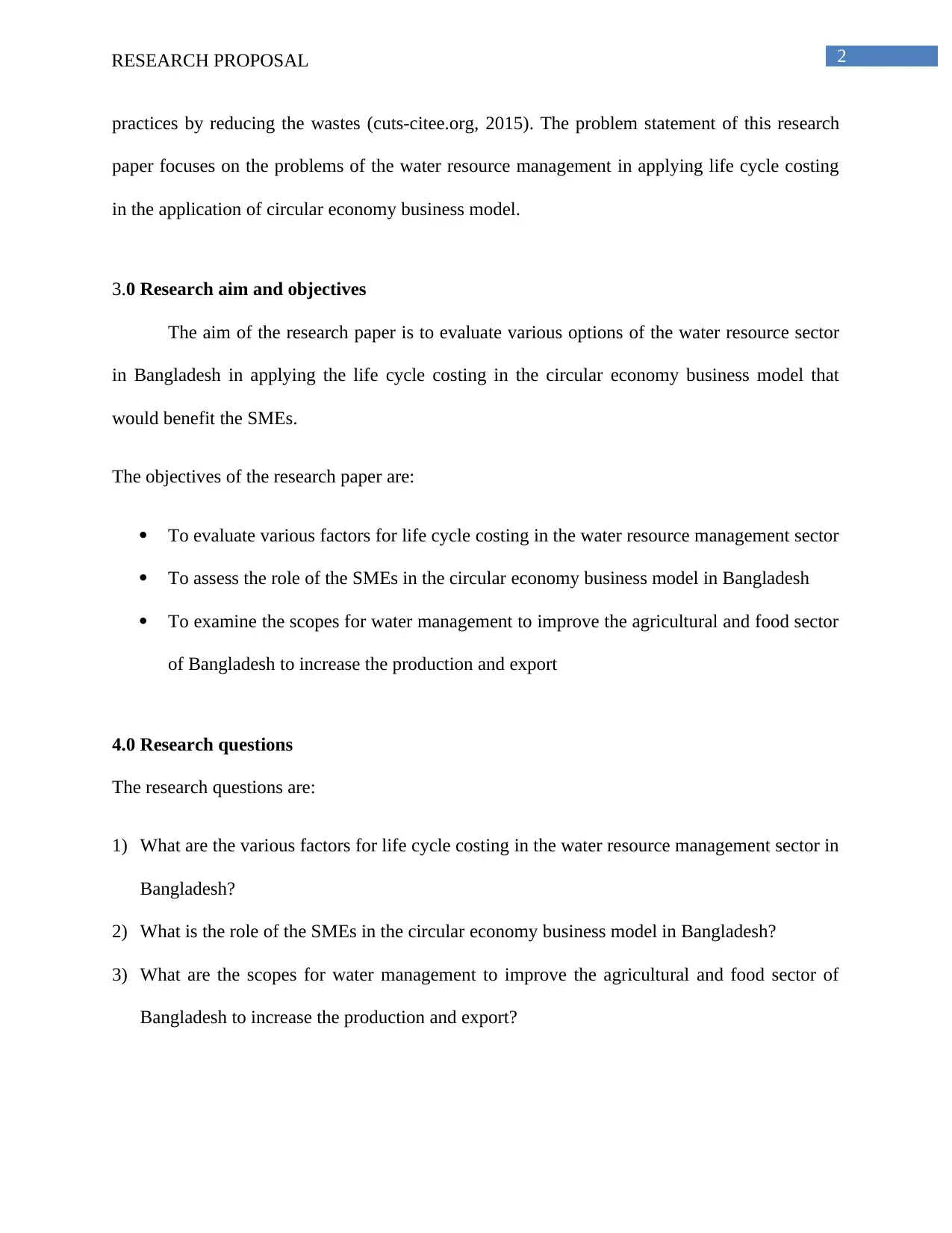
2RESEARCH PROPOSAL
practices by reducing the wastes (cuts-citee.org, 2015). The problem statement of this research
paper focuses on the problems of the water resource management in applying life cycle costing
in the application of circular economy business model.
3.0 Research aim and objectives
The aim of the research paper is to evaluate various options of the water resource sector
in Bangladesh in applying the life cycle costing in the circular economy business model that
would benefit the SMEs.
The objectives of the research paper are:
To evaluate various factors for life cycle costing in the water resource management sector
To assess the role of the SMEs in the circular economy business model in Bangladesh
To examine the scopes for water management to improve the agricultural and food sector
of Bangladesh to increase the production and export
4.0 Research questions
The research questions are:
1) What are the various factors for life cycle costing in the water resource management sector in
Bangladesh?
2) What is the role of the SMEs in the circular economy business model in Bangladesh?
3) What are the scopes for water management to improve the agricultural and food sector of
Bangladesh to increase the production and export?
practices by reducing the wastes (cuts-citee.org, 2015). The problem statement of this research
paper focuses on the problems of the water resource management in applying life cycle costing
in the application of circular economy business model.
3.0 Research aim and objectives
The aim of the research paper is to evaluate various options of the water resource sector
in Bangladesh in applying the life cycle costing in the circular economy business model that
would benefit the SMEs.
The objectives of the research paper are:
To evaluate various factors for life cycle costing in the water resource management sector
To assess the role of the SMEs in the circular economy business model in Bangladesh
To examine the scopes for water management to improve the agricultural and food sector
of Bangladesh to increase the production and export
4.0 Research questions
The research questions are:
1) What are the various factors for life cycle costing in the water resource management sector in
Bangladesh?
2) What is the role of the SMEs in the circular economy business model in Bangladesh?
3) What are the scopes for water management to improve the agricultural and food sector of
Bangladesh to increase the production and export?
⊘ This is a preview!⊘
Do you want full access?
Subscribe today to unlock all pages.

Trusted by 1+ million students worldwide
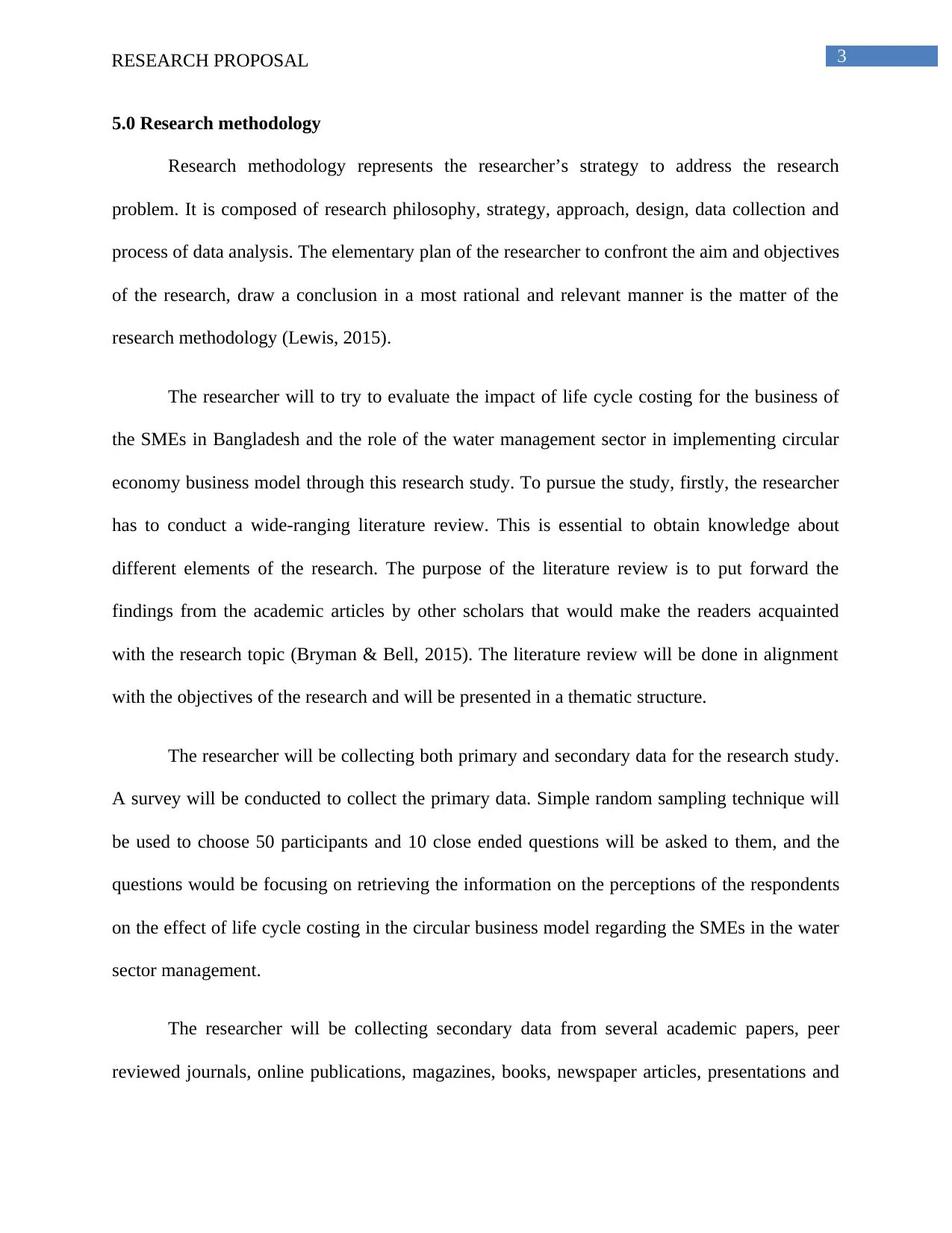
3RESEARCH PROPOSAL
5.0 Research methodology
Research methodology represents the researcher’s strategy to address the research
problem. It is composed of research philosophy, strategy, approach, design, data collection and
process of data analysis. The elementary plan of the researcher to confront the aim and objectives
of the research, draw a conclusion in a most rational and relevant manner is the matter of the
research methodology (Lewis, 2015).
The researcher will to try to evaluate the impact of life cycle costing for the business of
the SMEs in Bangladesh and the role of the water management sector in implementing circular
economy business model through this research study. To pursue the study, firstly, the researcher
has to conduct a wide-ranging literature review. This is essential to obtain knowledge about
different elements of the research. The purpose of the literature review is to put forward the
findings from the academic articles by other scholars that would make the readers acquainted
with the research topic (Bryman & Bell, 2015). The literature review will be done in alignment
with the objectives of the research and will be presented in a thematic structure.
The researcher will be collecting both primary and secondary data for the research study.
A survey will be conducted to collect the primary data. Simple random sampling technique will
be used to choose 50 participants and 10 close ended questions will be asked to them, and the
questions would be focusing on retrieving the information on the perceptions of the respondents
on the effect of life cycle costing in the circular business model regarding the SMEs in the water
sector management.
The researcher will be collecting secondary data from several academic papers, peer
reviewed journals, online publications, magazines, books, newspaper articles, presentations and
5.0 Research methodology
Research methodology represents the researcher’s strategy to address the research
problem. It is composed of research philosophy, strategy, approach, design, data collection and
process of data analysis. The elementary plan of the researcher to confront the aim and objectives
of the research, draw a conclusion in a most rational and relevant manner is the matter of the
research methodology (Lewis, 2015).
The researcher will to try to evaluate the impact of life cycle costing for the business of
the SMEs in Bangladesh and the role of the water management sector in implementing circular
economy business model through this research study. To pursue the study, firstly, the researcher
has to conduct a wide-ranging literature review. This is essential to obtain knowledge about
different elements of the research. The purpose of the literature review is to put forward the
findings from the academic articles by other scholars that would make the readers acquainted
with the research topic (Bryman & Bell, 2015). The literature review will be done in alignment
with the objectives of the research and will be presented in a thematic structure.
The researcher will be collecting both primary and secondary data for the research study.
A survey will be conducted to collect the primary data. Simple random sampling technique will
be used to choose 50 participants and 10 close ended questions will be asked to them, and the
questions would be focusing on retrieving the information on the perceptions of the respondents
on the effect of life cycle costing in the circular business model regarding the SMEs in the water
sector management.
The researcher will be collecting secondary data from several academic papers, peer
reviewed journals, online publications, magazines, books, newspaper articles, presentations and
Paraphrase This Document
Need a fresh take? Get an instant paraphrase of this document with our AI Paraphraser
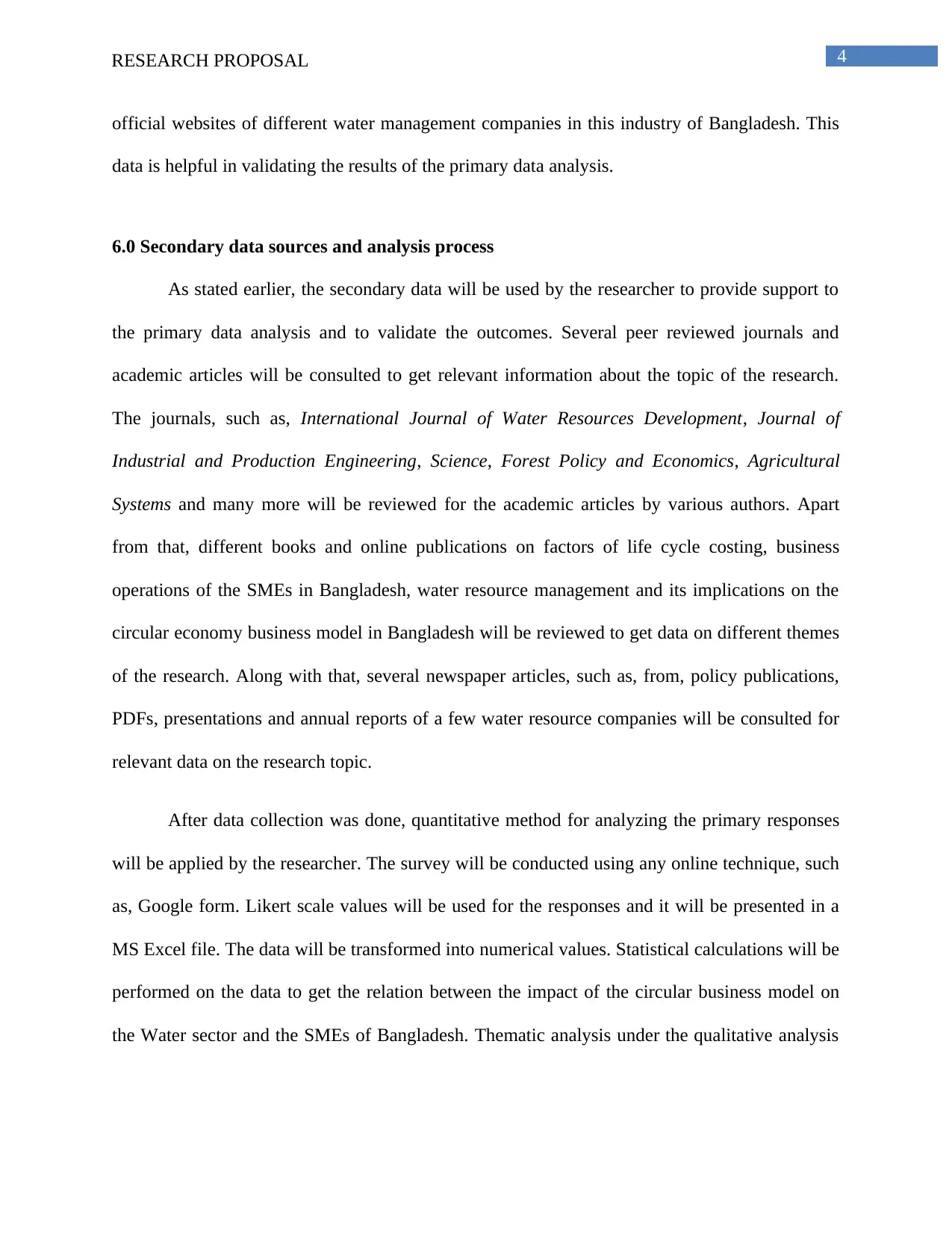
4RESEARCH PROPOSAL
official websites of different water management companies in this industry of Bangladesh. This
data is helpful in validating the results of the primary data analysis.
6.0 Secondary data sources and analysis process
As stated earlier, the secondary data will be used by the researcher to provide support to
the primary data analysis and to validate the outcomes. Several peer reviewed journals and
academic articles will be consulted to get relevant information about the topic of the research.
The journals, such as, International Journal of Water Resources Development, Journal of
Industrial and Production Engineering, Science, Forest Policy and Economics, Agricultural
Systems and many more will be reviewed for the academic articles by various authors. Apart
from that, different books and online publications on factors of life cycle costing, business
operations of the SMEs in Bangladesh, water resource management and its implications on the
circular economy business model in Bangladesh will be reviewed to get data on different themes
of the research. Along with that, several newspaper articles, such as, from, policy publications,
PDFs, presentations and annual reports of a few water resource companies will be consulted for
relevant data on the research topic.
After data collection was done, quantitative method for analyzing the primary responses
will be applied by the researcher. The survey will be conducted using any online technique, such
as, Google form. Likert scale values will be used for the responses and it will be presented in a
MS Excel file. The data will be transformed into numerical values. Statistical calculations will be
performed on the data to get the relation between the impact of the circular business model on
the Water sector and the SMEs of Bangladesh. Thematic analysis under the qualitative analysis
official websites of different water management companies in this industry of Bangladesh. This
data is helpful in validating the results of the primary data analysis.
6.0 Secondary data sources and analysis process
As stated earlier, the secondary data will be used by the researcher to provide support to
the primary data analysis and to validate the outcomes. Several peer reviewed journals and
academic articles will be consulted to get relevant information about the topic of the research.
The journals, such as, International Journal of Water Resources Development, Journal of
Industrial and Production Engineering, Science, Forest Policy and Economics, Agricultural
Systems and many more will be reviewed for the academic articles by various authors. Apart
from that, different books and online publications on factors of life cycle costing, business
operations of the SMEs in Bangladesh, water resource management and its implications on the
circular economy business model in Bangladesh will be reviewed to get data on different themes
of the research. Along with that, several newspaper articles, such as, from, policy publications,
PDFs, presentations and annual reports of a few water resource companies will be consulted for
relevant data on the research topic.
After data collection was done, quantitative method for analyzing the primary responses
will be applied by the researcher. The survey will be conducted using any online technique, such
as, Google form. Likert scale values will be used for the responses and it will be presented in a
MS Excel file. The data will be transformed into numerical values. Statistical calculations will be
performed on the data to get the relation between the impact of the circular business model on
the Water sector and the SMEs of Bangladesh. Thematic analysis under the qualitative analysis

5RESEARCH PROPOSAL
technique will be conducted on the secondary data for evaluating the validity and reliability of
the results of the primary data analysis.
technique will be conducted on the secondary data for evaluating the validity and reliability of
the results of the primary data analysis.
⊘ This is a preview!⊘
Do you want full access?
Subscribe today to unlock all pages.

Trusted by 1+ million students worldwide
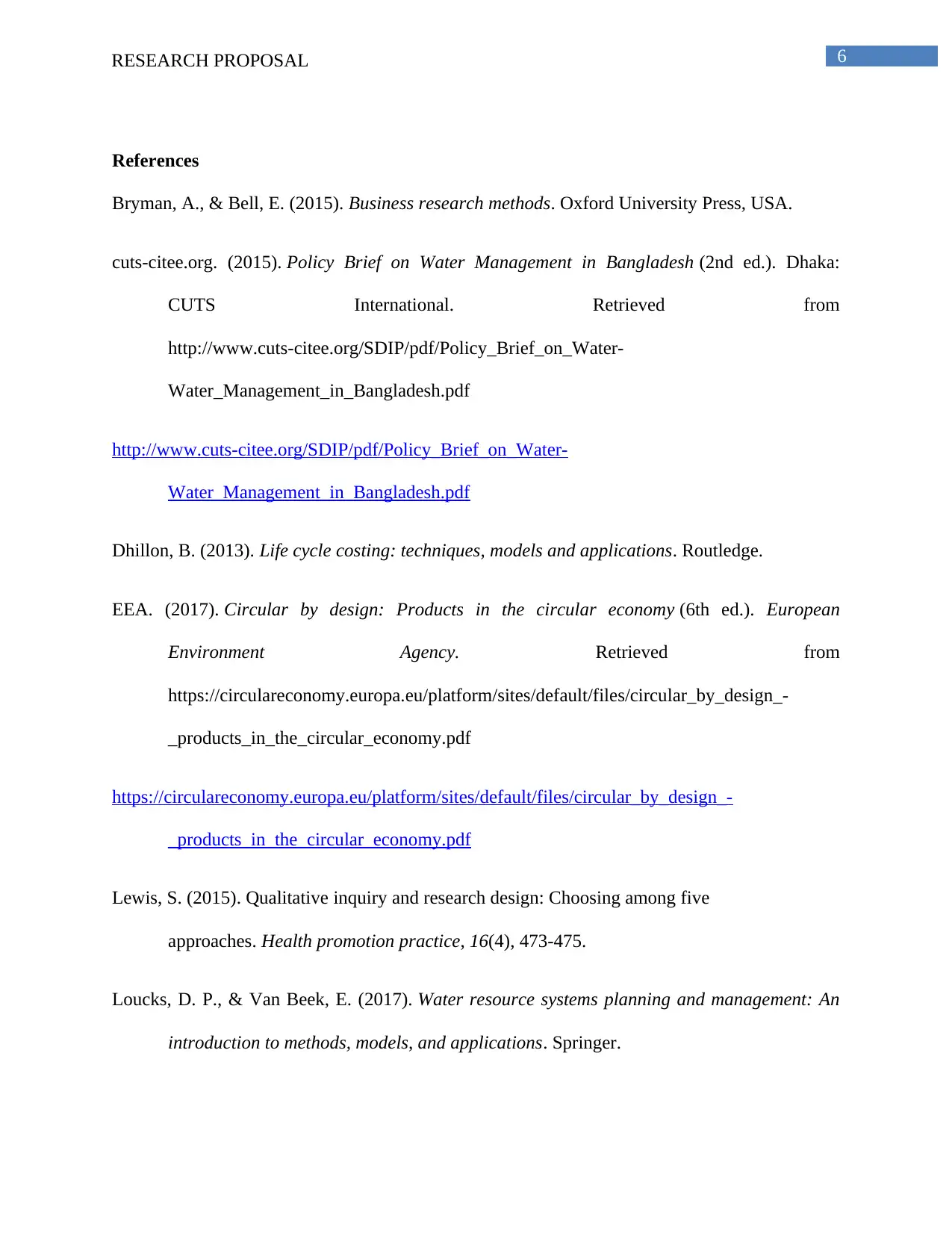
6RESEARCH PROPOSAL
References
Bryman, A., & Bell, E. (2015). Business research methods. Oxford University Press, USA.
cuts-citee.org. (2015). Policy Brief on Water Management in Bangladesh (2nd ed.). Dhaka:
CUTS International. Retrieved from
http://www.cuts-citee.org/SDIP/pdf/Policy_Brief_on_Water-
Water_Management_in_Bangladesh.pdf
http://www.cuts-citee.org/SDIP/pdf/Policy_Brief_on_Water-
Water_Management_in_Bangladesh.pdf
Dhillon, B. (2013). Life cycle costing: techniques, models and applications. Routledge.
EEA. (2017). Circular by design: Products in the circular economy (6th ed.). European
Environment Agency. Retrieved from
https://circulareconomy.europa.eu/platform/sites/default/files/circular_by_design_-
_products_in_the_circular_economy.pdf
https://circulareconomy.europa.eu/platform/sites/default/files/circular_by_design_-
_products_in_the_circular_economy.pdf
Lewis, S. (2015). Qualitative inquiry and research design: Choosing among five
approaches. Health promotion practice, 16(4), 473-475.
Loucks, D. P., & Van Beek, E. (2017). Water resource systems planning and management: An
introduction to methods, models, and applications. Springer.
References
Bryman, A., & Bell, E. (2015). Business research methods. Oxford University Press, USA.
cuts-citee.org. (2015). Policy Brief on Water Management in Bangladesh (2nd ed.). Dhaka:
CUTS International. Retrieved from
http://www.cuts-citee.org/SDIP/pdf/Policy_Brief_on_Water-
Water_Management_in_Bangladesh.pdf
http://www.cuts-citee.org/SDIP/pdf/Policy_Brief_on_Water-
Water_Management_in_Bangladesh.pdf
Dhillon, B. (2013). Life cycle costing: techniques, models and applications. Routledge.
EEA. (2017). Circular by design: Products in the circular economy (6th ed.). European
Environment Agency. Retrieved from
https://circulareconomy.europa.eu/platform/sites/default/files/circular_by_design_-
_products_in_the_circular_economy.pdf
https://circulareconomy.europa.eu/platform/sites/default/files/circular_by_design_-
_products_in_the_circular_economy.pdf
Lewis, S. (2015). Qualitative inquiry and research design: Choosing among five
approaches. Health promotion practice, 16(4), 473-475.
Loucks, D. P., & Van Beek, E. (2017). Water resource systems planning and management: An
introduction to methods, models, and applications. Springer.
Paraphrase This Document
Need a fresh take? Get an instant paraphrase of this document with our AI Paraphraser

7RESEARCH PROPOSAL
Makkink, S. (2016). Circular economy, the new business opportunities in the sanitation
sector!. Aquaforall.org. Retrieved 21 March 2018, from http://aquaforall.org/circular-
economy-the-new-business-opportunities-in-the-sanitation-sector/
http://aquaforall.org/circular-economy-the-new-business-opportunities-in-the-sanitation-sector/
Makkink, S. (2016). Circular economy, the new business opportunities in the sanitation
sector!. Aquaforall.org. Retrieved 21 March 2018, from http://aquaforall.org/circular-
economy-the-new-business-opportunities-in-the-sanitation-sector/
http://aquaforall.org/circular-economy-the-new-business-opportunities-in-the-sanitation-sector/
1 out of 8
Related Documents
Your All-in-One AI-Powered Toolkit for Academic Success.
+13062052269
info@desklib.com
Available 24*7 on WhatsApp / Email
![[object Object]](/_next/static/media/star-bottom.7253800d.svg)
Unlock your academic potential
Copyright © 2020–2026 A2Z Services. All Rights Reserved. Developed and managed by ZUCOL.





